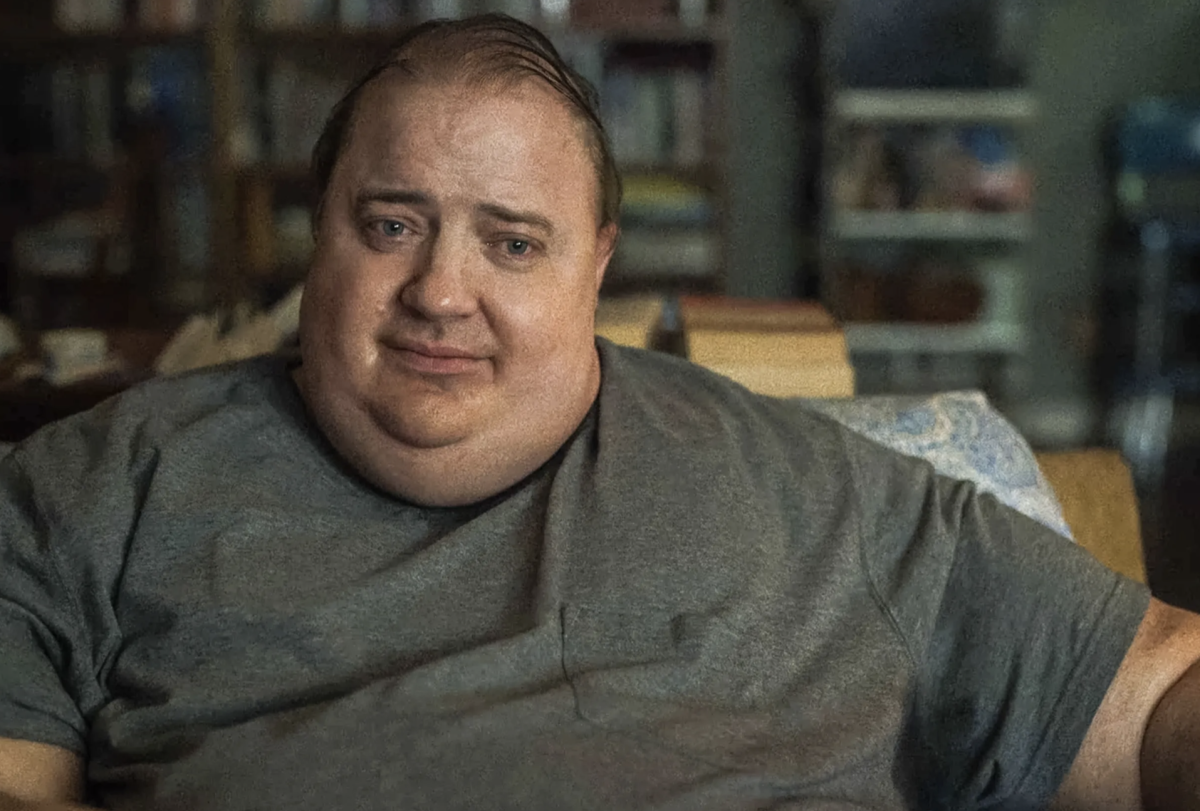
Brendan Fraser stars as Charlie in the film adaptation of The Whale. Photo: Supplied.
Charlie is a morbidly obese American living in an apartment in the US State of Idaho. He teaches online English classes to university students while apparently intent on eating himself to death.
The cause of Charlie’s gluttony is entwined with the man he left his family for, Alan, and because of some tragic circumstances, he is now on an inevitable decline.
Into this mix comes Liz, his friend, a nurse, who has done her best to get him treatment, and a young Mormon, Thomas, who believes there can be religious emancipation if Charlie accepts God into his heart.
But the only thing Charlie really wants is the acceptance of the daughter from whom he became estranged when he left his family all those years ago.
The Whale began as a play written in 2012 by Samuel D Hunter and it won a Drama Desk Award the following year. It’s now made its way onto the screen, this time directed by the controversial yet often quite brilliant director Darren Aronofsky (Pi, Requiem for a Dream, The Black Swan, Mother!, Noah).
The film begins with Charlie (Brendan Fraser) seemingly masturbating and, at the same time, having a heart attack when Elder Thomas (Ty Simpkins) knocks on his door.
Charlie is only calmed when the young man reads a passage from an essay on Herman Melville’s epic novel Moby Dick. Liz (Hong Chau) arrives to settle things down.
Not long afterwards, but separately, his highly judgemental daughter, Ellie (Sadie Sink), enters the picture and the stage is set.
The Whale is very much a play that has been filmed, as opposed to adapting a play to the screen with all the demands those changes make; it is no surprise that Hunter wrote the screenplay. And this is where the discomfort begins.
In the cinema, I felt like I was sitting in a theatre a dozen rows back watching a hyper-dramatic story of bereavement and loss. It didn’t feel natural, nor did I feel included.
Inclusion isn’t a prerequisite for feeling involved, but it is important that the main character fascinates you and draws you into their humour, drama, mania or complexity at least.
The character of Charlie keeps apologising for what he has become, gorges himself, and then states regally that people are amazing. This becomes tiresome. The premise of The Whale, circling around Moby Dick, is unclear. What does it mean?
Is Charlie an extended metaphor for the loss of purpose somewhere between Melville and the narrator of the book, Ishmael, who disappears midway through the story without explanation?
Is he the Whale, described, essentially, as a form without conscience or some sort of shifting amalgam of the three? Is there something about the rage of the embittered Captain Ahab that needs addressing?
None of these, which I thought were essential to unlocking the character, are ever fully explained or realised; it’s always more a case of high drama blocking out some better essential story.
Brendan Fraser has been nominated for the best actor Oscar for this film. It’s his comeback role after a few years away because of a highly publicised alleged sexual assault, family issues, health and a fall into depression. He imbues the character with a lot of empathy, but Charlie’s story needs much more strength and narrative.
Hong Chau has received the nomination for best supporting actress; she is the strongest performer in the film, and it wouldn’t surprise me in the least if she receives the Academy Award.
Darren Aronofsky needed to take the play out of the theatre and reimagine it in his own image as he did with Hubert Selby’s Requiem for a Dream, turning it into something vital and new.
Sadly, The Whale fails on all but the very rudimentary elements I’ve outlined. I found it, in the end, little more than an exercise in frustration and disappointment.
Two stars out of five.













